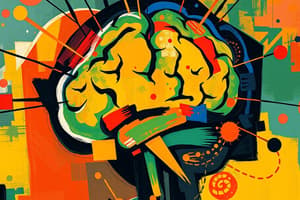Podcast
Questions and Answers
Which of the following WHO-QOL domains directly addresses the impact of mental health conditions on an individual's life?
Which of the following WHO-QOL domains directly addresses the impact of mental health conditions on an individual's life?
What distinguishes a transition from a change in the context of adjustment?
What distinguishes a transition from a change in the context of adjustment?
Which of the following is NOT categorized as a type of transition by Schlossberg?
Which of the following is NOT categorized as a type of transition by Schlossberg?
In discussing quality of life, which aspect is considered in the WHO definition?
In discussing quality of life, which aspect is considered in the WHO definition?
Signup and view all the answers
Which best describes 'non-events' as per Schlossberg's theory?
Which best describes 'non-events' as per Schlossberg's theory?
Signup and view all the answers
Which characteristic is essential for 'anticipated transitions'?
Which characteristic is essential for 'anticipated transitions'?
Signup and view all the answers
Which model should be utilized to map a transition effectively?
Which model should be utilized to map a transition effectively?
Signup and view all the answers
What is primarily highlighted in the adjustment process according to the content?
What is primarily highlighted in the adjustment process according to the content?
Signup and view all the answers
Which element is likely considered when evaluating subjective well-being?
Which element is likely considered when evaluating subjective well-being?
Signup and view all the answers
What is the impact of adjustment on physical and mental health?
What is the impact of adjustment on physical and mental health?
Signup and view all the answers
In the context of stress and coping, what does coping primarily refer to?
In the context of stress and coping, what does coping primarily refer to?
Signup and view all the answers
Study Notes
Course Information
- Course name: PSY3130 Psychology of Adjustment
- Textbook: Human Adjustment (Second Edition) by Jane S. Halonen and John W. Santrock
- Exam format: Wise flow exam with two parts.
- Part 1: 25 multiple-choice questions (MCQs), 50% of the total mark.
- Part 2: One essay question (500-750 words), 50% of the total mark.
Lecture Guide Topics
- The Nature of Adjustment
- Adjustment across the Lifespan
- The adjustment process and transitions
- Stress and coping
- The 'Self' in adjustment
- Social thinking, emotional intelligence, subjective wellbeing
- Applications to:
- Gender and Sexuality
- Careers and Work
- Love, Intimacy, Relationships, and Attachment
- Adjustment and Physical and Mental Health
Building Up to the Essay Question
- Start a journal
- Identify a transition (Schlossberg, 1984) you want to discuss
- Map this transition using Dai Williams's (1999) model (discussed in Lecture 2)
- Make notes and explain this transition, its impact, and apply the concepts learned in lectures.
Key Concepts
- Change: A shift in a situation where something has altered.
- Transition: A psychological reorientation people need to make in response to change. It's the internal process they go through adapting.
- Transition (definition from Schlossberg, 1984): Any event or non-event that results in changed relationships, routines, assumptions, roles, and identity
Types of Transitions
- Anticipated transitions: Predictable events like marriage, graduation, birth of a child.
- Unanticipated transitions: Unexpected occurrences like job loss, sudden death.
- Non-events: Expected transitions that don't happen, such as a missed promotion or a relationship that didn't form
Quality of Life (QOL)
- The WHO definition: An individual's perception of their position in life within their culture, reflecting goals, expectations, standards, and concerns.
- Critical point: Life circumstances can change how individuals define quality of life, which can be measured with WHO-QOL facets.
WHOQOL Assessment Domains and Facets
- Domain I (Physical): Pain and discomfort, energy/fatigue, sexual activity, sleep, and rest.
- Domain II (Psychological): Emotions, thinking/learning/memory/concentration, self-esteem, body image.
- Domain III (Level of Independence): Mobility, daily activities, dependence on substances/medical aids, communication capacity, work capacity.
- Domain IV (Social Relationships): Personal relationships, social support, activities as provider/supporter.
- Domain V (Environment): Freedom/safety/security, home environment, work satisfaction, financial resources, health/social care, opportunities/leisure, physical environment (pollution, noise, etc).
- Domain VI (Spirituality): Spirituality/religion/beliefs play a part in coping and resilience.
Factors Affecting Perceptions of Quality of Life
- Circumstances
- Age
- Life transitions
- Personality
- Stress and coping
- Health conditions (physical and mental)
- Finances
Studying That Suits You
Use AI to generate personalized quizzes and flashcards to suit your learning preferences.
Related Documents
Description
Test your knowledge on the key concepts from PSY3130, focusing on the nature of adjustment, stress and coping, and the 'self' in adjustment. This quiz includes multiple-choice questions and prepares you for the essay component relating to life transitions and wellbeing. Evaluate your understanding of how adjustment relates to various life domains.




